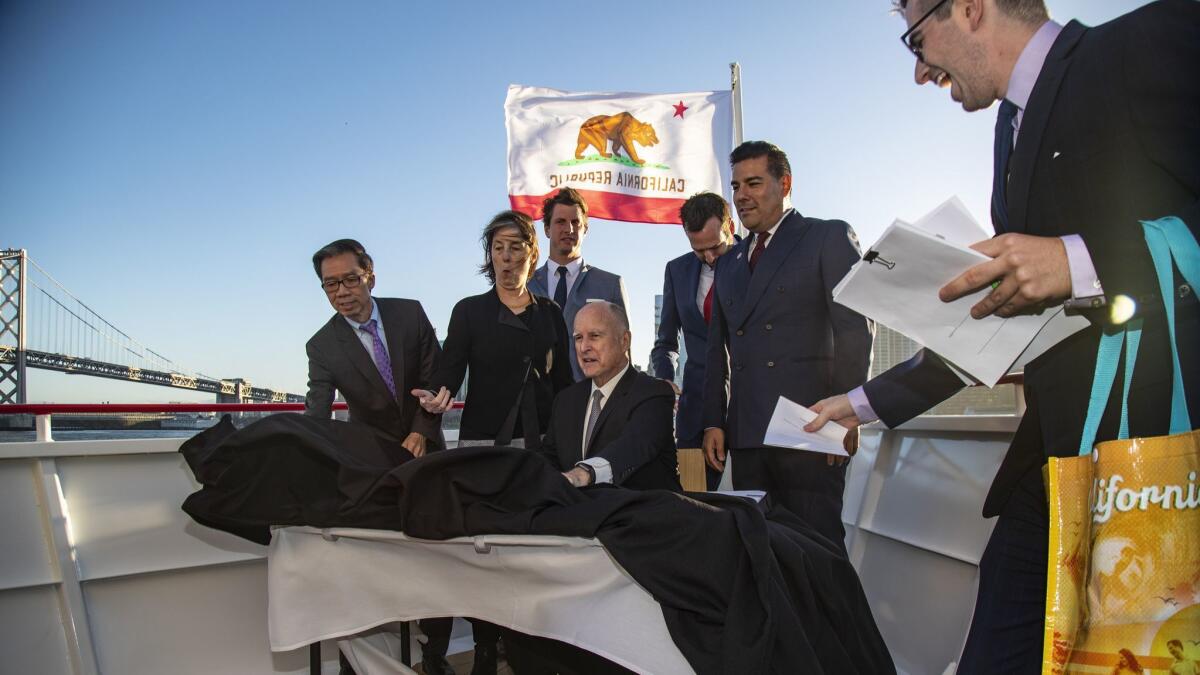By announcing Californiaâs first satellite launch, Gov. Jerry Brown ends climate summit with a cosmic boom

Reporting from San Francisco â When Gov. Jerry Brown said California should launch its own satellite in the 1970s, the plan was considered so far-fetched that critics dubbed him Gov. Moonbeam.
But on Friday, Gov. Moonbeam struck back. Brown concluded his climate change summit promising the state would send its own satellite into orbit to track the formation of pollutants that cause climate change.
The announcement was the most audacious of dozens of pledges political and business leaders made at a conference that sent a clear signal: Either get on board with the fast-moving transition or get left behind.
âWeâre under attack by a lot of people, including Donald Trump, but the climate threat still keeps growing,â Brown said as he capped off the Global Climate Action Summit in San Francisco. âSo we want to know what the hellâs going on, all over the world, all the time. So weâre going to launch our own satellite, our own damn satellite, to figure out where the pollution is and how are we going to end it.â
A statement from his office said the initiative will make it possible to âpinpoint â and stop â destructive emissions ⦠on a scale thatâs never been done before.â
If there was one obvious takeaway from this unprecedented gathering of leaders from local, state and foreign governments as well as the private sector, it was that they are not going to let Washington impede their plans. The attendees made clear they intend to carry the world toward meeting the goals of the Paris agreement on climate change â which President Trump has disavowed â even if it means states must launch their own space programs.
The landmark summit also aimed to put on notice leaders in the public and private sector hedging on climate action, giving them warning that they could face consequences more immediate than a warmer planet some decades from now. They also risk short-term stagnation, both economic and environmental.
The governorâs summit â and the Trump administrationâs reluctance to pursue robust climate research â opened the door wide for Brown to pull a version of his satellite idea out of the archives and announce what would be Californiaâs first space launch.
The state will develop the satellite with the San Francisco-based Earth imaging firm Planet Labs, a company founded by ex-NASA scientists in 2010. California may ultimately launch multiple satellites into space, according to the governorâs office. The California Air Resources Board is in the process of developing the monitoring technology used by the satellite. No date has been set for the launch, but it will probably be several years away.
Officials at the air board discussed the possibility of the satellite at their July meeting, where they expressed concern that the Trump administration had mothballed plans to use innovative technology to monitor the pollutants from space.
Robbie Schingler, co-founder of Planet Labs, said the project will inform âhow advanced satellite technology can enhance our ability to measure, monitor and ultimately mitigate the impacts of climate change.â
The state hopes to put the satellite to use in locating the sources of climate pollutants, which would enable it to refine its regulatory approach and better understand how to confront warming. Data from the satellite would be made available to the public through a partnership with the Environmental Defense Fund, which is launching its own pollution-monitoring satellite in 2021. The nonprofitâs spacecraft will focus exclusively on monitoring methane emissions coming out of 80% of the worldâs oil and gas production facilities.
âWe need to see who is emitting how much greenhouse gas,â Fred Krupp, president of the Environmental Defense Fund, said in an interview at the summit. âHaving an eye in the sky allows us to find out who is releasing how much.â
He said space technology offers new methods to track whether companies are complying with environmental laws and keeping to their commitments to cut emissions.
âThese technologies that make monitoring less expensive are turbo-driving environmental efforts,â Krupp said. âIt gives us hope.â
The more aggressive engagement of technology in all fronts of climate action was a major theme of the summit. In the case of the satellite project, it is part of a broader international data-sharing effort that officials hope can drive the elimination of greenhouse gases equaling that spewed by 200 million vehicles each year.
Californiaâs satellite project will be funded by donors, including Dee and Richard Lawrence and the Jeremy and Hannelore Grantham Environmental Trust. The state is recruiting more partners.
The space-age commitment was the splashiest of the three-day summit, but it was just one of several dozen climate pledges made by the cities, states and businesses participating.
The commitments add up to a formidable acceleration of the global clean economy, which is growing to encompass everything from the cars we drive to the food we eat to the buildings we inhabit.
âOur world is in the early stages of a sustainability revolution,â former Vice President Al Gore said in a speech Friday. âIt has the magnitude of the Industrial Revolution and the speed of the digital revolution.â
Plans were put in motion to install 3.5 million more electric-vehicle chargers worldwide within the next seven years. There are currently fewer than half a million. California will impose emissions targets on the ride-share and autonomous vehicle industries, accelerating the production of electric cars. The state of Minnesota, which relies heavily on coal power, was among several big states and cities around the world joining a coalition vowing to go coal-free in the near future. Walmart and Unilever made major forest sustainability pledges. McDonaldâs is among the nearly 500 companies now working with a nonprofit to slash the carbon footprint of everything it does â from beef production to packaging â to conform with the Paris goals.
The summit highlighted how the American states that are most rapidly embracing these changes are already showing stronger economic growth than those hewing to the Trump administrationâs approach â a stark counterpoint to the White House narrative that boosting fossil fuel dependence is key to prosperity.
âThe states in the U.S. Climate Alliance have had greater economic growth while this group has been in existence than the states that are not in this group,â said Washington Gov. Jay Inslee, a member of the group of 17 governors that banded together after Trump pulled the U.S. out of the Paris agreement.
Alliance members are vowing to meet the emissions reduction targets in the international accord nonetheless.
âIf we were a separate nation, we would represent the third-largest economy in the world,â Inslee said.
Times staff writers Tony Barboza and John Myers contributed to this report.
The latest look at the Trump administration and the rest of Washington »
More stories from Evan Halper »
[email protected] | Twitter: @evanhalper
More to Read
Get the L.A. Times Politics newsletter
Deeply reported insights into legislation, politics and policy from Sacramento, Washington and beyond. In your inbox three times per week.
You may occasionally receive promotional content from the Los Angeles Times.











